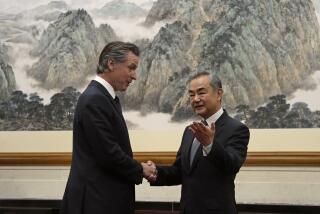Husband’s Business Ties to China Dog Feinstein
- Share via
For years, international financier Richard C. Blum’s vast business portfolio has persisted as a nettlesome issue for his wife, Sen. Dianne Feinstein (D-Calif.), a vocal proponent of increased China trade.
Three years ago, he vowed to turn over any profits from his China investments to charity.
Last year, as Feinstein prepared to run for reelection, Blum says, he disposed of his remaining personal investment in mainland China to avoid any hint of impropriety.
Even so, Blum continues to manage a partnership that has invested in China, records and interviews show. And he, his partnerships or accounts he manages have major interests in an airline seeking U.S. government approval to expand its China business and in a South Korean bank that operates a joint venture in China.
After inquiries about his China-related business, Blum pledged this week that he “will not invest in mainland China or Hong Kong as long as Dianne Feinstein is a U.S. senator to avoid even the appearance of conflict.”
He said profits from Hong Kong investments, like those from the mainland, would go to charities he established to benefit impoverished Himalayan people. He specifically committed about $400,000 from a Hong Kong real estate investment sold this year.
Through a spokesman, Blum said any money he receives from managing the investments of others in China also will go to charity.
“We have done everything we possibly can,” Feinstein said in exasperation. “I can’t tell my husband to die. I can’t tell him to give up what he does. . . . I don’t know what more I can do. I mean, get divorced and live in sin, I suppose.”
Blum’s finances have drawn scrutiny in part because his holdings and the funds he manages are so extensive and complex that government-required disclosure forms do not show precisely where the money is invested.
His China investments have become a target because Feinstein long has been active in promoting U.S.-China relations and recently supported the congressional vote to grant China permanent normal trade relations.
Questions about Blum’s financial affairs illustrate the difficulties facing any candidate whose spouse has large financial interests. The issue was raised this year by Rep. Tom Campbell (R-San Jose), Feinstein’s opponent in the Nov. 7 election. When there was speculation that Feinstein could be Vice President Al Gore’s presidential running mate, political analysts cited her husband’s investments as a potential liability.
“All candidates with rich and powerful spouses are walking in the shadow of Geraldine Ferraro,” said John J. Pitney Jr., associate political science professor at Claremont McKenna College, referring to the 1984 Democratic vice presidential candidate whose husband’s business became a political albatross.
Blum says he has never benefited from his wife’s positions on China. “I can’t think of one single reason why the Chinese leadership would be wanting to help us with investment opportunities,” Blum wrote to The Times, calling himself an outspoken critic of China’s human rights record and a supporter of Tibet’s exiled religious leader, the Dalai Lama.
Blum declined to be interviewed, but he responded in writing to questions through a spokesman, who emphasized that “Sen. Feinstein does not participate in Mr. Blum’s business in any way.”
Feinstein grew angry when asked about her husband’s investments.
“There’s no conflict of interest,” the senator said in an interview. “I take what I do very seriously. It’s my lifeblood. I’m not going to jeopardize my public trust.”
Feinstein provided The Times a letter showing that she consulted the Senate Ethics Committee before the vote on China trade. The letter said the committee did not consider her vote a conflict because it could benefit all people doing business in China, not just Blum.
Gary Ruskin, director of the Congressional Accountability Project, a government watchdog group in Washington, said he sympathizes with the desire of public officials to keep parts of their lives private.
But with the hundreds of millions of dollars handled by Blum and his firm, Feinstein and Blum must “bend over backward in order to convince voters that they’re not profiting from her governmental actions,” Ruskin said. That means, he said, fully disclosing Blum’s holdings.
Feinstein’s disclosure statement--which runs 84 pages and indicates that she and Blum had at least $27 million in assets at the end of 1999--lists Blum’s partnerships but not all the investments of those partnerships.
The couple made available their 1999 tax return, showing they paid $1.7 million in taxes on almost $9.3 million in income while donating $1.9 million to charity.
Extensive Ties to Asia
Blum, 65, is a money manager whose business is based in San Francisco, not far from the Transamerica pyramid.
He is chairman of BLUM Capital Partners L.P., which, along with its affiliates, manages $3.5 billion in assets invested in companies involved in everything from high technology to aviation. Blum and his firm have interests in dozens of partnerships.
Blum also is a director of companies such as Northwest Airlines, Korea First Bank in South Korea, Playtex and Shaklee. He is honorary consul to Nepal and Mongolia and once served as an unpaid “special foreign advisor” to Shanghai International Trust and Investment Co., a government-owned investment firm.
As the husband of a senator and former mayor of San Francisco, Blum has enjoyed access to Chinese officials. He has accompanied his wife on trips to China, including one in August 1999 when she delivered a letter from President Clinton to President Jiang Zemin, seeking to jump-start talks on China’s entry into the World Trade Organization. The couple paid their own way.
In the mid-1980s, Blum invested in a trading company and a building in China. A spokesman said the investments were liquidated in 1994, two years after Feinstein was elected to the Senate.
That year, Blum joined forces with Texas financier David Bonderman to create Newbridge Associates Ltd. to seek investments in emerging countries such as China.
With more than $100 million in capital, the first Newbridge limited partnership bought major interests over the next few years in a Chinese pig iron company and in leading Chinese producers of soybean milk and candy.
His business activity generated enough controversy that in 1997 he pledged to donate profits from his China investments to the American Himalayan Foundation, a charity he founded and runs out of his office to support social programs in Tibet and other countries in the region.
Last May, as Feinstein campaigned for reelection, Campbell accused her of failing to fully disclose Blum’s financial interests. “Do you or your family have any holdings in China?” Campbell asked.
A Feinstein campaign aide said Blum no longer had any investments in “mainland China.”
Earlier that month, Blum had divested himself of an investment in a Hong Kong-based Internet company, Asiacontent.com, his spokesman said recently.
When asked whether Blum planned to donate the profits from Hong Kong investments to charity, his spokesman initially said that no commitment had been made to do so. But days later, the spokesman said Blum’s investment of $100,000 to $200,000, in fact, had been placed into a charitable trust on May 1, because it was mistakenly listed as a mainland China investment, not a Hong Kong investment.
In fall 1998, Newbridge Asia II, another firm, bought a stake in Kerry Properties, a large Hong Kong-based property investment and development company with projects throughout China.
Blum’s spokesman said that Newbridge sold its interest in Kerry in April and August and that Blum would give his approximately $400,000 profit to the charitable trust.
The Newbridge partnership, of which Blum is co-chairman, made two investments in recent months in China: China Civilink Ltd., an Internet provider, and Zhongxing-Suntek Data Communication Co. But Blum’s stake in the investments was simultaneously transferred to an irrevocable charitable trust, according to his spokesman.
Blum sold his last personal investment in mainland China--North Dragon Iron & Steel Group--on Dec. 1, 1999, although Newbridge still has an investment in the company, his spokesman said, noting that Blum lost $105,383 last year on mainland China investments.
Blum’s earlier $490,000 investment in Shanghai Pacific Partners made a $203,000 profit, he said, and now is in liquidation.
Stakes in Firms With China Presence
Newbridge Capital Ltd., formerly Newbridge Associates, last year bought a controlling interest in Korea First Bank for a reported $415 million. Blum is a board member of the bank, which affiliated with Qingdao International Bank in China three years earlier.
The China-Korea joint venture, Blum’s spokesman said, constitutes only about 1% of Korea First’s assets. “The fact that Korea Bank may be doing business in China is . . . no different than any other company located in the United States--such as Boeing, GE, GM or IBM--doing business in mainland China,” he said.
Blum owns interests in Northwest Airlines and iAsiaworks, a San Mateo company that has set its sights on China’s Internet market.
His spokesman said Blum’s partnerships and accounts he manages own about $116 million in stock in Northwest, which in 1998 signed a three-year passenger sharing agreement with Air China, China’s flag carrier. Northwest is seeking U.S. Department of Transportation approval to add flights to China.
Blum has $457,000 invested in iAsiaWorks, and the company had $47,000 in China revenue last year, his spokesman said.
Blum expressed dismay over continued questions about his business, noting that last year he received an award from the Dalai Lama. He and his wife donated about $560,000 to the Himalayan foundation.
“I am very proud to have received this award, but it’s hardly one I would have been interested in if I care at all about making money in China,” Blum wrote.
*
Times librarian Paul Singleton contributed to this report.
More to Read
Inside the business of entertainment
The Wide Shot brings you news, analysis and insights on everything from streaming wars to production — and what it all means for the future.
You may occasionally receive promotional content from the Los Angeles Times.











